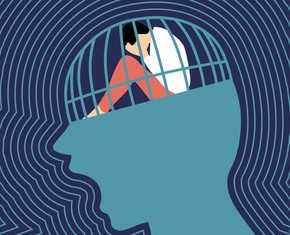The views expressed in our content reflect individual perspectives and do not represent the authoritative views of the Baha'i Faith.
No grief can match the pain a parent feels after the loss of a child.
No one knows the emotional sense of loss more than parents who have lost a baby to SIDS or a child to some bizarre form of cancer, or a youth to an auto accident, or a young adult to war or other forms of the senseless violence that plagues our contemporary world. It is needless to recite here the catalogue of possible tragedies that may await even the most careful among us—drive-by shootings, sexual predators, exotic drugs, depression and suicide, and on and on.
“We are sorry for your loss,” the detectives say on the TV shows immediately before interviewing the bereaved parents. The actors portraying grieving parents may shed a tear or two, possibly hang their heads in feigned sadness, but no writer or actor can approximate the blaring horror that would actually be displayed in real life, the ear-piercing sirens of grief, the heaving chests gasping for air as wave upon wave of disbelief is interspersed with attempts to awaken from a nightmare that will not stop, not now, not tomorrow morning, not ever.
“We know this isn’t the best time to ask you questions,” the TV detectives say, and the fake parents will calm down, just minutes or hours after the tragedy, and rattle off reams of facts and statistics and names and places. Real-life parents in the same situation would wave off queries or words or hands or faces. They would wave off life itself if they could, jump from this life and this consciousness if they could. And when, if ever, they escape from this dark and lonely cave of sorrow, they know that in dreams and unguarded moments, visions of the lost child, the martyred youth, the dutiful soldier will forever be an appendage to their conscious life.
Abdu’l-Baha’s Counsel to Grieving Parents
In several instances in the Baha’i writings, Abdu’l-Baha offers impressive tokens of consolation derived from the divine logic of the Baha’i paradigm of life. In this touching letter he wrote to two grieving parents, Abdu’l-Baha assured them the youth has not really died, that instead, he has been freed from the trials of this life. And yet, while bestowing on them the consolation that the youth is still alive in the heavenly realm, he acknowledges the validity of their “sorrow and grief:”
O ye two patient souls! Your letter was received. The death of that beloved youth and his separation from you have caused the utmost sorrow and grief; for he winged his flight in the flower of his age and the bloom of his youth to the heavenly nest. But he hath been freed from this sorrow-stricken shelter and hath turned his face toward the everlasting nest of the Kingdom, and, being delivered from a dark and narrow world, hath hastened to the sanctified realm of light; therein lieth the consolation of our hearts. – Selections from the Writings of Abdu’l-Baha, p. 199.
However, his further consolation is neither vague nor conveyed in such broad and philosophical strokes. Abdu’l-Baha stated that there is a divine wisdom in this seeming injustice—that spiritual version of the law of thermodynamics again—and he bestows on them a remarkably powerful and effective poetic image of a gardener transplanting a tender shrub that it may grow more fully and bear its fruit:
The inscrutable divine wisdom underlieth such heart-rending occurrences. It is as if a kind gardener transferreth a fresh and tender shrub from a confined place to a wide open area. This transfer is not the cause of the withering, the lessening or the destruction of that shrub; nay, on the contrary, it maketh it to grow and thrive, acquire freshness and delicacy, become green and bear fruit. This hidden secret is well known to the gardener, but those souls who are unaware of this bounty suppose that the gardener, in his anger and wrath, hath uprooted the shrub. – Ibid.
The power of this analogy is twofold. First it attempts to explain that the child’s death is not an arbitrary or needless or unnecessary event—that there is a divine wisdom in what they perceive to be blatant injustice or the apparent “wrath” of the gardener. Though we should note here, as other Baha’i teachings likewise confirm, that the nature of this wisdom will most probably remain veiled to the parents during this life. In fact, in one discussion Baha’u’llah notes that among those things we cannot understand in this life are, first, the suffering of the innocent, and, second, where God’s will ends and our own begins.
Secondly, the image of the gardener explains that there is not only a hidden justice in this seeming injustice, but that there is a very specific purpose involved. Somehow, the Baha’i teachings reassure us, this act will redound to the benefit of the youth and enable him to “bear fruit”—to make the most of the nascent capacity with which he has been endowed, something that could not have occurred in any other way. Had the youthful plant been made to remain in association with an earthly form, the development of the soul would have become hindered and root-bound.
Abdu’l-Baha’s major point here, I sense, is that this “hidden secret,” which the Gardener alone is presently privy to comprehending, not only enables justice; it also brings about a bounty for the youth that otherwise would not have been possible, or at least would not have been accomplished as well. In short, this theory is not merely asserting that God can redeem this misfortune or make something good come from a tragic circumstance. He is asserting forthrightly that could the parents but understand the divine wisdom in this event, as they will be able to do in the continuation of their lives in the spiritual realm, they would appreciate that this was not “unfortunate” at all, but the best of all possible choices and outcomes for the ultimate destiny of the child.
This is the exactly the sort of justice I had in mind in my early youth, exactly what I meant when I invented the first law of thermodynamics, even though I did not at the time realize that Gottfried Leibniz had posited the very same theory in the 17th century—that everything turns out for the best. Of course, it is a pretty inescapable conclusion for anyone who believes in God. If God is, and if God is the way He is commonly portrayed (completely loving, forgiving, all-powerful, all-knowing) then how could it be otherwise? There has to be justice in the long run, however veiled from us it may temporarily be.
















Comments
Sign in or create an account
Continue with Googleor